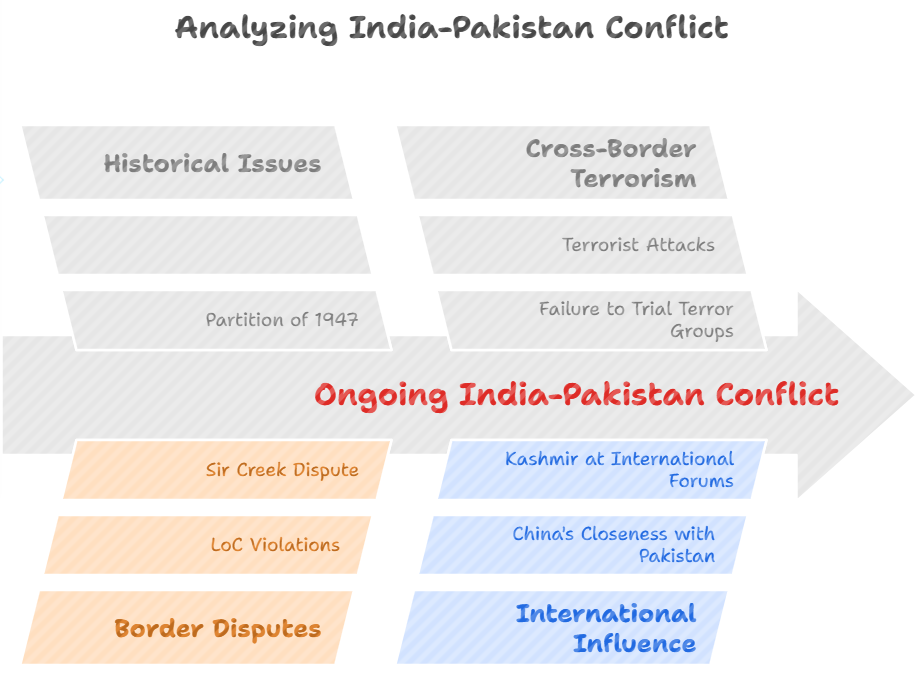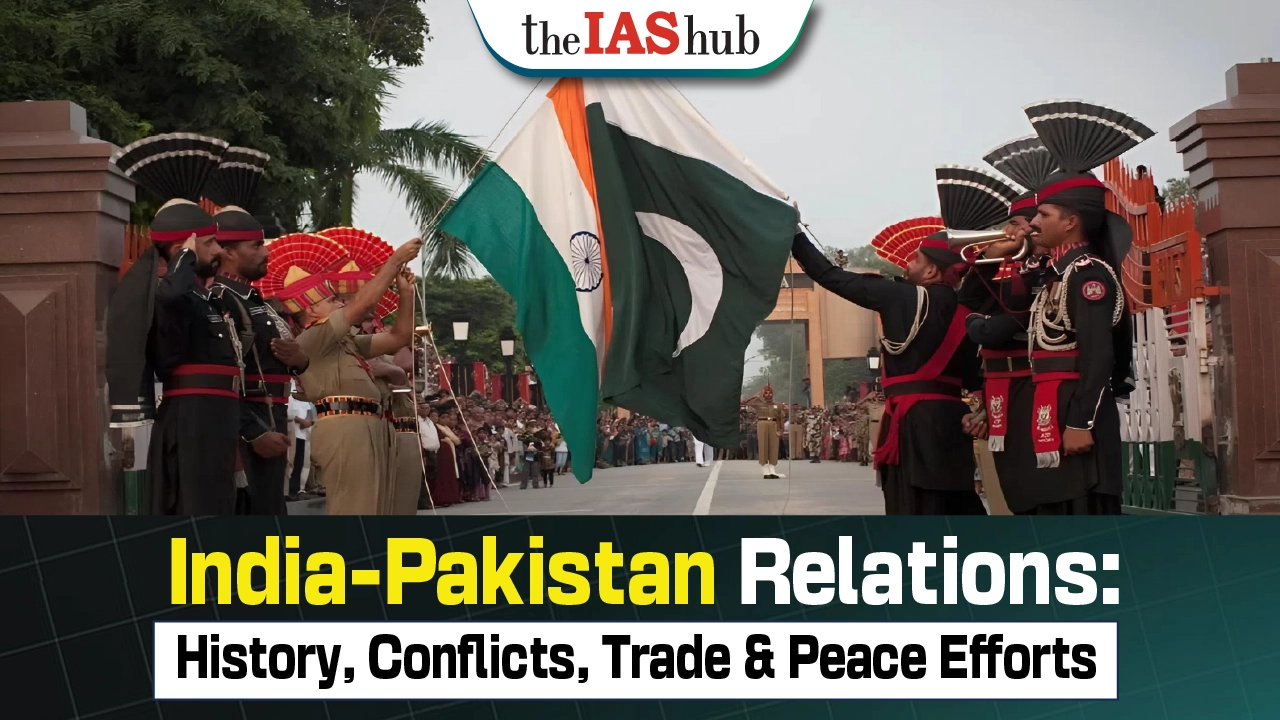India Pakistan Relations: India has followed a consistent and principled policy towards Pakistan i.e.: in keeping with its “Neighbourhood First Policy”, India seeks normal neighbourly relations with Pakistan in an environment free from terror, hostility and violence;
India-Pakistan Relations: Reasons of Conflict
- Historical Reasons: The division of India and Pakistan in 1947, which led to the creation of separate countries based on religious lines, laid the foundation for ongoing tensions.
- Kashmir Issue: Both countries claim sovereignty over the region, and it has been a focal point of armed conflicts and tensions. The issue remains unresolved, and efforts to find a peaceful solution have been challenging.
- Border Dispute: The LoC serves as the de facto border between the two countries, and violations and skirmishes along the border have resulted in casualties and escalated tensions.
- Cross-Border Terrorism: Pakistan has been accused of supporting and harboring militant groups that carry out terrorist activities in India. Several major terrorist attacks, such as the 2008 Mumbai attacks, the 2019 Pulwama attack, Uri attack (2016), Poonch-Rajouri Attack (2023) and 2016 Pathankot attack have been attributed to groups operating from Pakistani territory.
- Failure to Trial Terror Groups: India has repeatedly urged Pakistan to take stronger action against terrorist organizations operating from its soil. However, the lack of progress in prosecuting individuals responsible for attacks, such as the Mumbai attacks, has been a significant point of contention.
- Revocation of Article 370: Unilateral actions taken by both countries have added to the conflict. For example, India's decision to revoke the special status of J&K in 2019 and Pakistan's subsequent measures, such as downgrading diplomatic relations and suspending bilateral trade, have further strained relations.
- Lack of Trade Cooperation: Limited trade cooperation between India and Pakistan has hampered economic ties and people-to-people exchanges. The low volume of bilateral trade and the failure to implement measures to boost trade have prevented the potential benefits of economic integration.
- Fishermen Disputes: Disputes over the maritime boundary and the arrest of fishermen from both countries crossing into each other's waters have added to the tensions. The issue of Sir Creek in the Kutch region remains unresolved, exacerbating the problem.
- International Influence: The involvement of external powers and their interests in the region, particularly China's growing closeness with Pakistan, has also impacted the India-Pakistan relationship. The Kashmir issue has been raised at international forums, increasing the complexity of the conflict.

|
India-Pakistan 2003 Ceasefire Agreement
- India and Pakistan decided to adhere to the 2003 ceasefire agreements along the Line of Control (LoC) and all other sectors.
- It came in the wake of over 5000 instances of Cross Fire Violations (CFVs) along the LoC and other areas in Jammu and Kashmir, resulting in 46 fatal casualties in 2020.
- This ceasefire was unanimously reached in November 2003, 4 years after the Kargil War (1999).
|
India-Pakistan Relations: Need for Peace Efforts
There is a pressing need for peace efforts to address the causes of conflict and establish better relations between India and Pakistan. The following are some reasons why peace efforts are crucial:
- Regional Stability: The conflicts and tensions between the two countries have broader implications and can impact the entire region's peace and prosperity.
- Economic Cooperation: Enhanced trade and connectivity can lead to economic growth, job creation, and improved living standards for the people of both countries.
- Countering Terrorism: Cooperation in counterterrorism efforts is crucial for the stability and security of the region.
- Resolution of Outstanding Issues: Addressing the core issues, such as the Kashmir dispute and border disputes, through peaceful dialogue can lead to long-term solutions and reduce tensions.
- Humanitarian Concerns: Peace efforts can address humanitarian concerns, such as the treatment of prisoners and fishermen from both countries who are caught in the conflict.
Recent Peace Initiatives
There have been recent peace initiatives between India and Pakistan, aimed at reducing tensions and fostering dialogue. Some of these initiatives include:
- Ceasefire Agreement: In February 2021, India and Pakistan reaffirmed their commitment to a ceasefire along the Line of Control, providing a significant reduction in border tensions.
- Track-II Diplomacy: Various unofficial channels, including Track-II diplomacy, have played a crucial role in fostering people-to-people contact and dialogue between India and Pakistan. Such efforts create space for constructive engagement and bridge the gap between official positions.
- Border Agreements: Both countries have reaffirmed their commitment to the 2003 ceasefire agreement along the Line of Control (LoC) to reduce border tensions.
- Joint Judicial Committee: The Joint Judicial Committee, which focuses on humanitarian issues of fishermen and prisoners, has been revived to address the concerns of both sides.
- Kartarpur Sahib Corridor Agreement: The agreement allows visa-free travel for Indian pilgrims to the Kartarpur Sahib Gurudwara in Pakistan, promoting people-to-people contact and religious tourism.
- Relaxation of Airspace Denial: India allowed the aircraft of the Pakistan Prime Minister to use Indian airspace during his visit to Sri Lanka, indicating a positive gesture.
- Trade Measures: Some measures have been taken to improve trade relations, such as lifting the ban on the import of medicines between the two countries.
India-Pakistan Relations: Trade Overview
|
India's exports to Pakistan
- In 2021, India exported goods worth $535 million to Pakistan.
- Major exports included vaccines, blood, raw sugar, and nitrogen heterocyclic compounds.
- Over the last 26 years, India's exports to Pakistan grew at an annualized rate of 7.76%.
- Exports increased from $76.5 million in 1995 to $535 million in 2021.
|
Pakistan's exports to India
In 2021, Pakistan exported goods worth $2.08 million to India.
- Major exports included tropical fruits, perfume plants, and scrap aluminum.
- Over the last 26 years, Pakistan's exports to India declined at an annualized rate of 10.9%.
Exports decreased from $42.5 million in 1995 to $2.08 million in 2021.
|
Way forward
To achieve lasting peace between India and Pakistan, the following steps can be considered:
- Broader Vision: Both countries should adopt a broader vision of regional cooperation and integration, focusing on shared economic prosperity and people-to-people contact.
- Core Issue Dialogue: Engaging in sustained dialogue and addressing the core issues, including the Kashmir dispute, can help find mutually acceptable solutions and build trust.
- International Cooperation: Engaging with the international community, including regional organizations like SAARC, can provide platforms for dialogue and mediation to resolve conflicts and promote peace. Pakistan's inclusion in the FATF Grey list can restrict its access to international markets, posing challenges to its faltering economy.
- Sustained Diplomacy: There is a need for sustained diplomatic efforts from both sides, with a focus on dialogue, trust-building, and conflict resolution, to pave the way for a peaceful coexistence. UN designation of Masood Azhar as a global terrorist will intensify the pressure on Pakistan to freeze the organization's assets and weaken the presence of Jaish-e-Mohammed.
Conclusion
It is essential to recognize that the path to peace will require patience, compromise, and a genuine commitment to resolving differences. However, the benefits of peace between India and Pakistan outweigh the challenges, making it a goal worth pursuing.
- Pakistan had revoked all trade ties with India following the August, 2019 decision to strike down Article 370 and reorganization of Jammu and Kashmir.
- However, it still allows import of cotton and sugar from India.
- However, an underlying reason for suspending trade was the 200% tariff imposed by India on Pakistani imports.
- India back then had responded to the revocation of Most Favoured Nation (MFN) status by Pakistan in the aftermath of the Pulwama terrorist attack.
|












